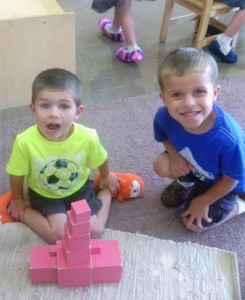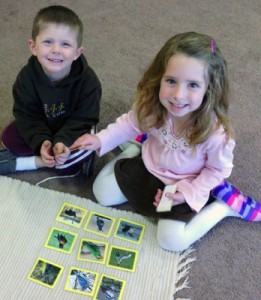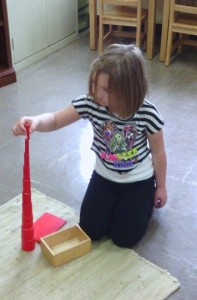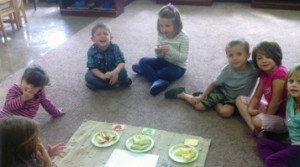Cuyahoga Falls, Ohio Preschool
To begin our school year we focused on grace and courtesy, love and respect, self-control and self-government. We develop these skills through purposeful work, beginning in the Practical Life area of the classroom. Practical Life is an essential component of the Montessori curriculum. Children learn skills that promote order, concentration, coordination, and independence. Therefore, many of the Practical Life activities are a preparation for math and language acquisition.
The materials in Practical Life are set up in a very orderly manner. The easiest work is located on the top left of the shelf. The child progresses through various levels of difficulty as the work becomes more involved or complex. For example, the first pouring work is two cups or containers that have no handles and no spouts. Usually one container has a dry ingredient such as beans. More difficult pouring work may include using a funnel to pour a liquid from one container to another.

Concentration is developed when the child is able to freely choose what she/he works on and for how long. As long as the child is not damaging the work nor is being disruptive to the other children and is not “hiding behind the work,” the child is free to develop his/her self-government skills through this independent work. The child can repeat the exercises as many times as he/she desires. Choice and repetition helps the child develop concentration.
Another component of Practical Life is movement. The materials in a Montessori environment are set up on shelves, in baskets or on trays so that the child can use a work at will after being given a presentation on it. The environment is purposefully designed so that the child can coordinate his/her movements and independently carry her/his basket or tray to a table. This freedom of movement allows children to develop courtesy; saying “excuse me” when passing another student.

“Walking on the line” is another aspect of movement. As a child learns to control his/her body movements, he/she becomes more confident. After our line walk each day we discussed what is means to be courteous of others, respectful of others and kind to one another. All students agreed that when we say “please,” “excuse me” and “thank you” we are being kind and respectful. We can show each other respect by the words we use and by how we help one another. We played The Silence Game, where the children sit quietly and listen to the sounds around them. We invite Hoot, our classroom owl to join us, and we light a candle in the center of our circle. Everyone sits quietly for about one minute listening, and then we discuss the sounds we heard during our game. This is becoming a favorite group activity. 
Children also learn social skills through Practical Life lessons. Children learn how to greet someone, how to appropriately interrupt, how to watch a friend work…Through direct instruction on some of these social skills, children learn early on how to handle a variety of situations. We do not assume that the child knows how to handle situations. Instead, we break down a task into step- by- step directions so the child can successfully learn social skills. Children also practice how to greet a visitor to the classroom, or give a guided tour. These and other skills are shown and practiced first and then implemented into daily living.

Ms. Kristen has been working with the students and planning wonderful lessons in the afternoons. The children have been singing, composing songs, learning sign language as well as cooking! She has also reinforced the ground rules that we have been working on. The consistency she provides for the classroom is a big part of why the beginning of the school year has been so successful!
We hope you are seeing some of the courteous and respectful behaviors we have been practicing in the classroom modeled at home. We have enjoyed our focus on practical life during the month of September it is the foundation of the Montessori curriculum that helps your child grow and mature in many ways as well as to become life long learners.
Here are some Practical Life activities to practice at home:
- Putting on / taking off all types of clothing: mittens, gloves, scarves, ear muffs, and caps
- Buttoning, Zipping
- Folding
- Hanging up clothes or putting them in drawers
- Putting on / taking off socks, shoes and boots
